词性转换法翻译
英译汉词性转换
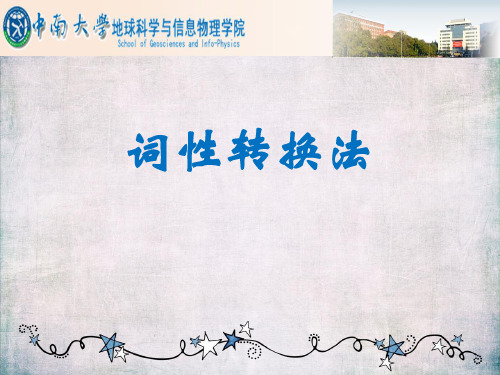
例:We should take full advantage of this opportunity to push the sales of our products.
• 英译汉的过程中,要使译文忠实原文,又 符合汉语的表达习惯,必须把词性适当地加 以转换。
词类转换的定义及特点
定义:一个单词不改变其形态便能从一个词 类转换成另一词类,这种构词法便叫做词类 转换或者零位派主。
特点:一个单词无需借助词缀便实现词类的 转换,这是词类转换的最大特点。
• 词类转换在英译汉中非常重要,处理不当 会导致两种情况,一是译文内容符合英语 原文,但不符合汉语表达;二是译文看似 符合汉语表达习惯,其内容却与英文原文 不符。
除准确传达了原文之意外,还很符合汉语 的表达习惯。
词类转换在英汉翻译中的体现
转换成动词的情况 转换成名词的情况 转换成形容词的情况 其它词类的转换
转换成动词的情况——名词转换成动词
1)由动词派生的名词转译成动词 例:The government called for the establishment of more technical schools.
转换成形容词的情况——副词转换成形容词 • 英语中的副词比汉语中的副词用得更广泛, 许多副词可以转换成形容词。
例:Earthquakes are closely related to faulting。
地震与地层断裂有密切的关系。
其它词类的转换——形容词和副词的相互转换
• 由于英语的名词或动词可以分别转换为汉 语的动词和名词,而修饰名词的形容词和 修饰动词的副词也可以随之转换为汉语的 副词和形容词。
转性译法(新)

第三章词法翻译(Translation of words)七、转性译法(Conversion)词性转换(E-C)名词动词介词动词形容词名词形容词副词副词名词形容词名词副词副词形容词一、转换成动词(一)名词转换成动词1. Rockets have found application for the exploration of the universe.火箭已经用来探索宇宙。
2. The sight of such a big plane filled the little boy with great curiosity.看到这么大的飞机,那个小男孩充满了好奇。
3. A glance through his office window offers a panorama of the Washington Monument.从他的办公室窗口一眼可以看到华盛顿纪念碑的全景。
4. The government called for the establishment of more technical schools.5. My suggestion is that he quit smoking at once.6. He is a keen lover of classic music.7. Some of my classmates are good singers.8. My admiration for him grew more.9. Last week he declared his discovery of a new planet.10. This novel defies classification.11. The international food shortage had a direct impact on Kuwait and other barren desert countries. (国际粮食短缺直接影响了科威特等贫瘠的沙漠国家。
四级翻译 第四章 词性转换法

第四章词性转换法•汉语动词使用频率高动词连用•英语往往只使用一个实义动词表达最主要的动作含义,其他动作含义则通常借用含有动作意义的动词不定义、分词、名词、形容词、介词、副词等表达。
一、动词的转译A 汉语动词(短语)转译为英语名词(短语)例1:中国的圣贤告诉人们在娱乐的时候不要只求满足自己,而要跟大家一块儿去追求快乐。
参考译文:Chinese sages advise people not to seek self-satisfaction in entertainment but to pursue happiness with others.一、动词的转译例2:上海的发展,从一个侧面反映了中国所发生的巨大变化。
参考译文:The growth of Shanghai is one reflection of the tremendous changes that have taken place in China.例3:中国人发明了火药,却从没有用来制造枪炮侵略别人。
参考译文:Chinese people invented gunpowder, but have never used it to make guns for invasion.一、动词的转译B.汉语动词(短语)转译为英语介词(短语)例1:秋天,菊花不怕风霜,不怕严寒,傲然开放。
参考译文:In autumn, the chrysanthemums blossom against wind, frost, and bitter cold.一、名词的转译在汉译英的转译中,汉语动词发生转移的情况较为普遍,但为了保持译文的顺畅和地道,也有将汉语名词转译为英语动词或其他此类的情况。
例:按照古人的说法,四季的特征是“春生,夏长,秋收,冬藏”。
参考译文:According to traditional proverbs, the four seasons are characterized by different events: birth in spring, growth in summer, harvest in autumn and storage in winter.一、形容词的转译英语中对抽象名词的使用较多,汉译英时有时需要将具体的形容词转移为抽象的名词。
翻译方法—词性转换
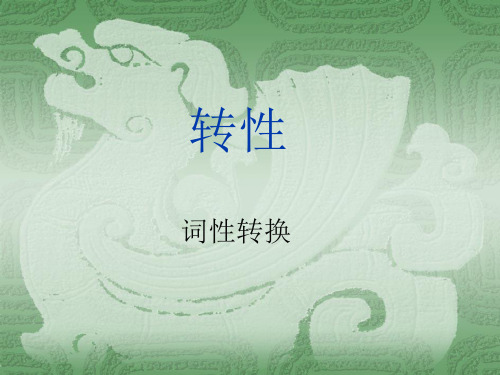
Until such time as mankind has the sense
to lower its population to the points where the planet can provide a comfortable support for all, people will have to accept more " unnatural food".
“印象”在汉语中只有名词词性,但英译时既可用名词 “impression”,也可用动词“impress”来表达。
2. 这种举止是罪犯的心理特征。 1. 他在剧中精彩的表演给我留下深刻的印象。
•This kind of behavior characterizes the criminal mind.
IBM公司计划拿出一些新产品与外国公司竞争。
2. 名词转译成形容词
(1)由形容词派生的名词 (2)a ∕ an+名词作表语时 a. The music is a gas. 这音乐妙极了。 As he is a perfect stranger in the city, I hope you will give him the necessary help. 他对这个城市完全陌生,我希望您能给他必要的帮助。
everything about the book except its publication.
•还有一些人同意这本书的每一句话,就是不同意出版这本书。
Rockets have found application for the exploration of the universe.
火箭已用来探索宇宙。
我们欢迎您周日晚到我校作报告。 这里的“speaker” 是由“speak+er”构成的名词,与 “guest” 组成“特邀演讲者”,“特邀报告者”,但如果将上句直译 成“欢迎您周日到我校当特邀演讲者”不很规范,显得说话 者汉语表达不地道。既然这样,不妨将“a guest speaker”转 换成动词,更通顺。
文言文翻译实词方法总结
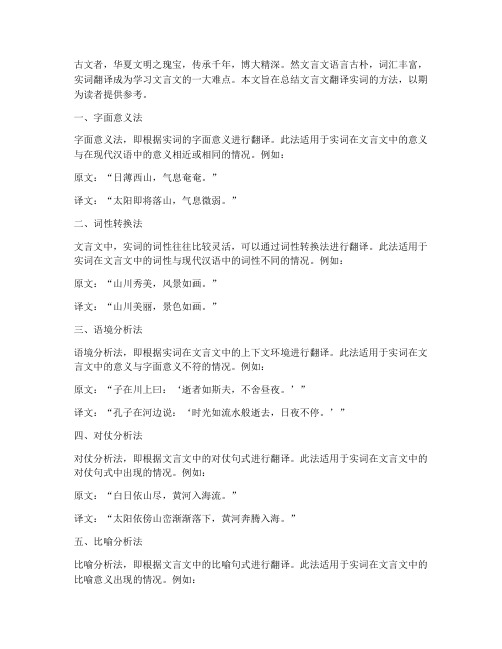
古文者,华夏文明之瑰宝,传承千年,博大精深。
然文言文语言古朴,词汇丰富,实词翻译成为学习文言文的一大难点。
本文旨在总结文言文翻译实词的方法,以期为读者提供参考。
一、字面意义法字面意义法,即根据实词的字面意义进行翻译。
此法适用于实词在文言文中的意义与在现代汉语中的意义相近或相同的情况。
例如:原文:“日薄西山,气息奄奄。
”译文:“太阳即将落山,气息微弱。
”二、词性转换法文言文中,实词的词性往往比较灵活,可以通过词性转换法进行翻译。
此法适用于实词在文言文中的词性与现代汉语中的词性不同的情况。
例如:原文:“山川秀美,风景如画。
”译文:“山川美丽,景色如画。
”三、语境分析法语境分析法,即根据实词在文言文中的上下文环境进行翻译。
此法适用于实词在文言文中的意义与字面意义不符的情况。
例如:原文:“子在川上曰:‘逝者如斯夫,不舍昼夜。
’”译文:“孔子在河边说:‘时光如流水般逝去,日夜不停。
’”四、对仗分析法对仗分析法,即根据文言文中的对仗句式进行翻译。
此法适用于实词在文言文中的对仗句式中出现的情况。
例如:原文:“白日依山尽,黄河入海流。
”译文:“太阳依傍山峦渐渐落下,黄河奔腾入海。
”五、比喻分析法比喻分析法,即根据文言文中的比喻句式进行翻译。
此法适用于实词在文言文中的比喻意义出现的情况。
例如:原文:“岁寒知松柏,患难见真情。
”译文:“岁寒时,才能看出松柏的坚韧;患难时,才能看出真情的可贵。
”六、成语分析法成语分析法,即根据文言文中的成语进行翻译。
此法适用于实词在文言文中的成语意义出现的情况。
例如:原文:“学而时习之,不亦说乎?”译文:“学习并时常温习,难道不是一件快乐的事情吗?”七、综合分析法综合分析法,即结合以上几种方法,对实词进行综合翻译。
此法适用于实词在文言文中的意义复杂,难以用单一方法进行翻译的情况。
例如:原文:“青青子衿,悠悠我心。
”译文:“青青的衣领,使我心情悠长。
”总之,文言文翻译实词需要结合具体语境,灵活运用各种方法。
英汉翻译词性转换

介词转化为汉语动词
• Mathematics as a language of science. • 数学是科学的语言。(谓语动词) • As soon as the supply reverses, the voltage across the thyristor will become positive, turning it on. • 只要电源一反向,加在可控硅上的电压就变为正,从而 使其导电。 • I barreled straight ahead, across the harbor and over the sea. • 我笔直向前高速飞行,越过港口,飞临海面。
形容词转化为汉语动词
• I am suspicious of that woman-I think she may have stolen something from the shop. • 我很怀疑那位妇女,我想她可能偷了商店的东西。 • Generally speaking, neither gold nor stone are soluble in water. • 一般来说,金子和石头都是不能在水中溶解的。
名词转化为汉语动词
• A slight variation from the exact size is always allowed. • 少许偏离准确尺寸还是可以允许的。 • The return to earth, for example, is always a big problem. • 举例来说,返回地球就总是个大问题。 • What has scientific progress left to science fiction? • 科学发展了,给科幻小说留下的是什么呢?
名词转化为汉语动词
英汉翻译2.词性转换法
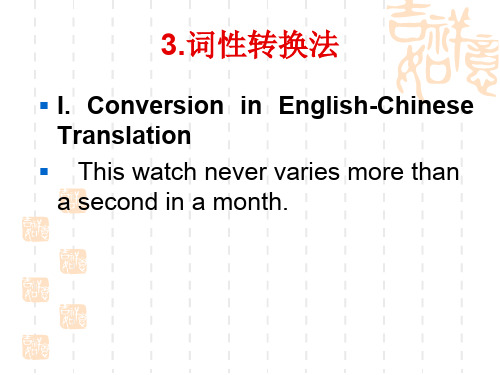
1) adjectives converted nouns
The steam turbine is less economical at cruising speed.
After careful treatment the deaf have recovered their hearing.
Doctors have said that they are not sure they can save his life.
They are quite content with the data obtained from the experiment.
If we were ignorant of the structure of the atom, it would be impossible for us to study nuclear physics.
3.词性转换法
I. Conversion in English-Chinese Translation
This watch never varies more than a second in a month.
1. Conversion into verbs 1) Nouns converted into verbs Rockets have found application for
the exploration of the universe. Some power plants are under
construction. The operation of a machine needs
some knowledge of its performance.
I am afraid I can’t teach you swimming. I think my little brother is a better teacher than I .
翻译技巧丨英语翻译之词性转换
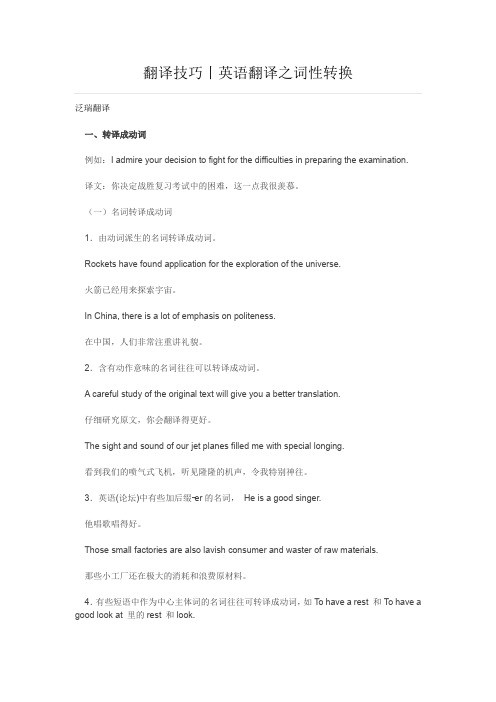
翻译技巧丨英语翻译之词性转换泛瑞翻译一、转译成动词例如:I admire your decision to fight for the difficulties in preparing the examination.译文:你决定战胜复习考试中的困难,这一点我很羡慕。
(一)名词转译成动词1.由动词派生的名词转译成动词。
Rockets have found application for the exploration of the universe.火箭已经用来探索宇宙。
In China, there is a lot of emphasis on politeness.在中国,人们非常注重讲礼貌。
2.含有动作意味的名词往往可以转译成动词。
A careful study of the original text will give you a better translation.仔细研究原文,你会翻译得更好。
The sight and sound of our jet planes filled me with special longing.看到我们的喷气式飞机,听见隆隆的机声,令我特别神往。
3.英语(论坛)中有些加后缀-er的名词,He is a good singer.他唱歌唱得好。
Those small factories are also lavish consumer and waster of raw materials.那些小工厂还在极大的消耗和浪费原材料。
4.有些短语中作为中心主体词的名词往往可转译成动词,如To have a rest 和To have a good look at 里的rest 和look.You must be tired. Why don’t you take a rest?你一定很累了,为什么不休息一会呢?The car braked sharply, coming to rest on the edge of the cliff.汽车猛的刹住,停在悬崖边上。
- 1、下载文档前请自行甄别文档内容的完整性,平台不提供额外的编辑、内容补充、找答案等附加服务。
- 2、"仅部分预览"的文档,不可在线预览部分如存在完整性等问题,可反馈申请退款(可完整预览的文档不适用该条件!)。
- 3、如文档侵犯您的权益,请联系客服反馈,我们会尽快为您处理(人工客服工作时间:9:00-18:30)。
词性转换法英语单词的词类与其语法功能有着密切的关系。
因此记住单词的词类对于掌握英语语法和分析句子结构有很大的帮助。
然而在翻译过程中,过分强调词性会限制表达时对整个句子的组织。
汉语和英语属于两种不同的语系,在词汇、语法和表达方式上存在着很大差异。
如果在翻译过程中过于拘泥于原文的词性,完全按照原文词性来进行翻译,往往会造成译文生硬别扭,不够通顺。
例如“Mastery of a language is not easy.”这句话如果直接译为“一门语言的掌握是不容易的”,汉语就会显得非常别扭。
但如果把“mastery”由名词转译为动词,翻译为“学好一门语言是不容易的”,就自然得多。
因此考虑到英汉两种语言的差异,为了使译文更加符合译入语的习惯,流畅自然,有时需要进行词性转换。
在英译汉过程中常用的词性转换通常有以下几种情况:1.转换成汉语的动词英汉两种语言在句法上的一个重大差异就是汉语当中动词的使用占优势,同一个句子中可以同时出现多个动词,而英语一个句子中只能出现一个谓语动词(或复合谓语)。
因此英语中动词的使用比汉语要少得多。
如:例1:The isolation of the rural world, because of distance and lack of transport facilities, is compounded by the paucity of media.译文:由于距离远,又缺乏交通设施,造成了农村与外界隔绝的情况,而这种情况又由于缺乏信息媒介而变得更加严重了。
例如:I admire your decision to fight for the difficulties in preparing the examination. 译文:你决定战胜复习考试中的困难,这一点我很羡慕该英文例句中只出现一个动词,但汉语译文中却用了四个动词。
如果翻译的过程中不进行词性转换而直接译为“由于距离和交通设施的缺乏而造成的农村的隔绝被信息媒介的缺乏加剧了”,整个句子就会非常拗口,变成了英语式的汉语。
因此在翻译过程中,为了使符合汉语的表达习惯,可以把英语其他词性的词转换为汉语中的动词。
1)名词转译成动词例2:Rockets have found application in the exploration of the universe.译文:火箭已经被用来探索宇宙。
例3:Two days after his disappearance his wife got the news of his death.译文:他失踪两天后,妻子得到了他的死讯。
例4:At the thought of his failure in this test, Brian felt greatly ashamed.译文:一想到自己未能通过这次测试,布莱恩就感到非常羞愧。
例5:This accident was resulted from his neglect of duties.译文:这次事故是由于他玩忽职守而造成的。
“singer”一词:例6:Elvis Presley is a world famous singer.译文;猫王是世界著名的歌手。
例7:Some of my classmates are very good singers.译文:我的一些同学歌唱得很好。
在这两个例句中,例6的“singer”一词是表示身份,职业的,而例7当中的singer”一词则侧重表示动作意义,很难找到一个意思对等的名词来翻译,因此转译为动词“唱”。
类似的例子还有:例8:I'm afraid I can't teach you swimming. My wife is a better teacher than I.译文:恐怕我不能教你游泳,我妻子比我教得好。
例9:We are exporters of the above goods, having a background of 30 years.译文:我们出口上述产品,已经经营了30年。
例10:He has been a ruler of that district for 20 years.译文:他统治那个地区已经20年了。
例11:All informed predictions of future performance are based upon some knowledge of past performance.译文:所有对未来表现有根据的预测都建立在了解过去相关表现的基础之上的。
例12:He taught us the value of every chance to practice.译文:他教导我们珍惜每一次练习的机会。
例13:Special attention should be paid to those expensive machines.译文:要特别注意这些昂贵的机器。
2)介词转换为动词英语中介词的使用频率相对于汉语来说要高得多。
实际上英语中很多介词在语境中可带有明显的动作意味,例如“书上!across, against, past, toward, through, with”等。
因此在翻译的过程中为了汉语表达的通顺流畅,可以根据具体情况将一些介词转译为动词。
例如:例14:Away she skipped over the lawn, up the path, up the steps, across the veranda and into the porch.译文:她转身蹦蹦跳跳地跑了,越过草地,踏上小径,跨上台阶,穿过凉台,进入门廊。
例15:…this nation under God, shall have a new birth of freedom, and that government of the people, by the people, for the people, shall not perish from the earth..译文:这个国家在上帝的保佑下,要获得自由的新生,而这个民有、民治、民享的政府将永远不会从地球上消失。
例16:Later all kinds of her legends were celebrated in pint and on film, in poetry and song.译文:随后,关于她的种种传说成为各种书籍、电影、诗歌和歌曲的内容广为流传。
例17:There are mountain ranges here with extensive forests and rich mineral resources.译文:这里有许多山脉,生长着大片的森林,贮藏着丰富的矿产。
例18:This proposal was against the spirit of group.译文:这个提议违背了集体主义精神。
例19:He came to my house for help.译文:他到我家里来请求帮助。
例20:Yesterday when I visited him at 10 o'clock, he was already between the sheets.译文:昨天我十点去他家的时候,他已经睡在被窝里了。
由动词派生的形容词在作表语时常常带有动作的意味,因此在译成汉语时往往转译为汉语的动词,例如:例21:The substances is not soluble in water.译文:这种物质不溶于水。
例22:They were suspicious and resentful of him.译文:他们不信任他,讨厌他。
例23:This solution is not acceptable.译文:这个解决办法无法让人接受。
例24:For a girl aged 12, such temptation is irresistible.译文:对于十二岁的小姑娘来说,很难抵制这样的诱惑。
英语中许多用来表示知觉、感受、欲望或信念的形容词往往也可以转译为动词,如“afraid, angry, aware, sorry, sure, certain”等。
例25:The child was afraid that his bad deeds in school would be known by his mother.译文:这个孩子很担心他妈妈会知道他在学校里干的那些坏事。
例26:A good leader is not content with merely taking care of what's already there.译文:一个好的领导不满足于仅仅守住已有的成就。
例27:Doctor said they were not sure they could save his life.译文:医生说他们不能确定是否能够挽救他的生命。
例28:He felt sorry for being rude to his mother.译文:他后悔对母亲无礼。
例29:Are you certain that she was not in the city at the time when death took place?译文:你敢肯定命案发生时她不在这个城市吗?例30:He was fully aware of the defects of this machine.译文:他清楚地知道这台机器的缺点。
在翻译过程中为了确切地表达其隐含的动作的意味,使译文更加自然通顺,也可以把某些形容词转译为汉语中的动词,例如:例31:Movies about Mickey Mouse have been popular with audience everywhere.译文:世界各地的观众都喜欢米老鼠的电影。
例32:It is a deplorable fact that the air is thick with dust.译文:空气中充满灰尘,这是个可悲的事实。
例33:They were news-hungry.译文:他们迫切地想获得消息。
4)副词转换为动词英语当中的副词在做表语或宾语补足语时也经常可以转译为汉语中的动词,例如:例34:This textbook will be out pretty soon.译文:这本教材很快就要出版了。
例35:She opened the window to let fresh air in.译文:她打开窗子让新鲜空气进来。
例36:In a gas the molecules are relatively far apart.译文:相对来说,气体分子相互离得很远。
